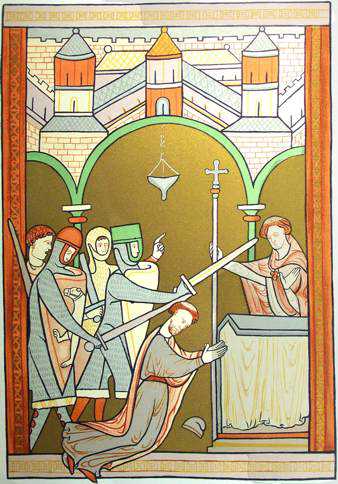Early kings: Henry II
Henry II, perhaps the greatest of English medieval kings, was a skilled administrator as well as a strong and able warrior. As the son of Matilda and Geoffrey Plantagenet, Henry II inherited titles to Normandy and Anjou, then also gained the duchy of Aquitaine through marriage. (The map on the next page illustrates what are now provinces in modern France.) His emphasis upon his hereditary right to the throne was a sign of changing notions of kingship, by which blood right became more important than election*, or baronial support, in securing the crown.
Henry's administration centralized control in the monarch, and began the formal codification of 'the common laws' into a system based on written forms and regular process which offered greater consistency and equality than the folk law that still prevailed in many local courts.
The murder of Thomas à Becket
Henry also tried to re-establish royal authority over the Church, but in so doing entered into conflict* with Thomas à Becket, Archbishop of Canterbury. Becket insisted upon the supremacy of the church over the king and refused to allow the clergy to be judged under royal law. He was murdered (1170) by four overzealous knights--an action that created such great popular outrage that the king was compelled to do public penance and to back off on his attempts to reduce the privileges of the clergy.
The church continued to gain power under Richard I and John. The shrine of St. Thomas Becket at Canterbury Cathedral became a popular shrine for pilgrims* until its destruction by Henry VIII during the English Reformation.
Footnotes
-
The Church and authority
Becket's argument:
"And since it is certain that kings receive their power from the Church, not she from them but from Christ, so, if I may speak with your pardon, you have not the power to give rules to bishops, nor to absolve or excommunicate anyone, to draw clerks before secular tribunals, ...and many other things of this sort which are written among your customs which you call ancient."
-
Becket's shrine
Chaucer's pilgrims in The Canterbury Tales are on their way to the shrine of Thomas à Becket. (Chaucer, who died in 1400, lived to see Richard II deposed in 1399.)
